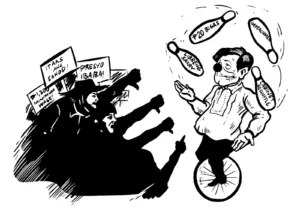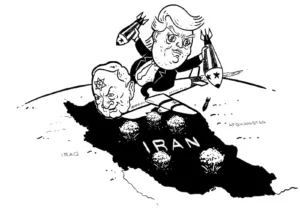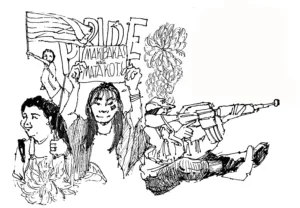By Fidel V. Agcaoili
Member and Spokesperson, NDFP Negotiating Panel
The NDFP has never asked the GRP to request the governments of the European Union and the US to de-list the CPP, NPA and Prof. Jose Maria Sison from their so-called terrorist lists. Indeed, the NDFP recognizes the limitation of and the embarrassment that would befall the GRP in asking these governments to undo what it had lobbied so hard with these governments to do in 2001 and 2002.
- Question: How many political prisoners are supposed to be freed? How many of these prisoners are part of the negotiations as consultants? As JASIG-protected persons? Who are the more prominent personalities to be freed? Is Randall Echanis part of this group, considering his case is now in court? Are there similarly situated people?
Reply: There are two types of persons under detention that the GRP is duty bound to release in order to comply with its obligations under previously signed agreements in preparation for the possible resumption of the formal talks in the peace negotiations.These are: a) 11 consultants and JASIG-protected persons under detention in violation of the JASIG, including Mr. Randall Echanis; and, b) 11 political prisoners whose releases have been ordered by GRP President Gloria Macapagal-Arroyo as early as 2001 (seven) and 2004 (four) but who are still in detention, despite agreements signed by both Parties and the representative of the Royal Norwegian Government as Third Party Facilitator. The charges against Mr. Echanis are trumped up. He was in military detention at the time the incident alleged in the charge sheet happened.
- Question: It is true that the NDF never asked Washington and several Western European States to de-list the CPP-NPA and Prof. Sison from their terrorism blacklist, but our understanding was the NDF was asking Manila to request for the de-listing. The terrorism blacklist was one of the most difficult issues in the delays in the resumption of talks. Has there been a change in the NDF position on this issue? I could not recall in the past that such a joint statement was proposed by the NDF.
Reply: The NDFP has never asked the GRP to request the governments of the European Union and the US to de-list the CPP, NPA and Prof. Jose Maria Sison from their so-called terrorist lists. Indeed, the NDFP recognizes the limitation of and the embarrassment that would befall the GRP in asking these governments to undo what it had lobbied so hard with these governments to do in 2001 and 2002.The NDFP proposal to help resolve the issue of "terrorist listing" has always been for the two Parties, the GRP and the NDFP, to sign a joint statement asserting the right of the Filipino people to national sovereignty and territorial integrity over events occurring in the Philippines. This is reflected in the attached 28 January 2003 statement of Prof. Sison, Chief Political Consultant of the NDFP in peace negotiations, and subsequently proposed by Mr. Luis Jalandoni, Chairperson of the NDFP Negotiating Panel, to Atty. Silvestre Bello III, Chairperson of the GRP Negotiating Panel at that time, in a letter referred to in the attached 21 February 2003 press release by Mr. Jalandoni. In fact, the NDFP proposal was presented, with several drafts of the joint statement discussed, during the two rounds of formal talks in 2004 in Oslo , Norway , in the presence of the Third Party Facilitator. Unfortunately no such joint statement was signed by the two Parties at that time. We are attaching herewith the First Oslo Joint Statement of 14 February 2004 and the Second Oslo Joint Statement of 3 April 2004 , containing references to effective measures to be undertaken to resolve the issue of "terrorist listing". We are also attaching the 20 July 2007 statement of Prof. Sison reiterating the NDFP proposal for a joint statement.
- Question: Why is there a rush for the NDF to return to talks when Gloria is stepping down next year? Is the NDF convinced and confident that a final peace deal with Manila can be reached in less than a year? What made the NDF agree to resume talks with the government? What did Manila promise to do that made the NDF sit down again?
Reply: There is no sudden rush by the NDFP to resume the formal talks in the peace negotiations. The NDFP considers the peace negotiations ongoing despite the so-called suspension of the JASIG by the GRP, the escalation in the extrajudicial executions, disappearances and torture of suspected NDFP consultants and JASIG protected persons, and the ongoing massive military operations by the GRP, including artillery and aerial bombardments, helicopter and gunfire strafing of houses, hamletting, forced evacuations, killings, illegal arrest and detention, and torture of civilians, in many parts of the country against communities suspected to be under the control, supervision or supportive of the revolutionary movement.The NDFP has declared its openness to resume the formal talks in the peace negotiations anytime that the GRP manifests its willingness to reaffirm and comply with all previously signed agreements and to discuss the second item on social and economic reforms in the four point agenda item of the peace negotiations. The NDFP can negotiate with the GRP as a political entity regardless of who is sitting as the GRP president.
Attachments:
- 28 January 2003 statement of Prof. Jose Maria Sison, NDFP Chief Political Consultant
- 21 February 2003 press release by Mr. Luis G. Jalandoni, Chairperson of the NDFP Negotiating Panel
- 14 February 2004 First Oslo Joint Statement
- 3 April 2004 Second Oslo Joint Statement
- 20 July 2007 statement of Prof. Sison reiterating NDFP proposal for joint statement











